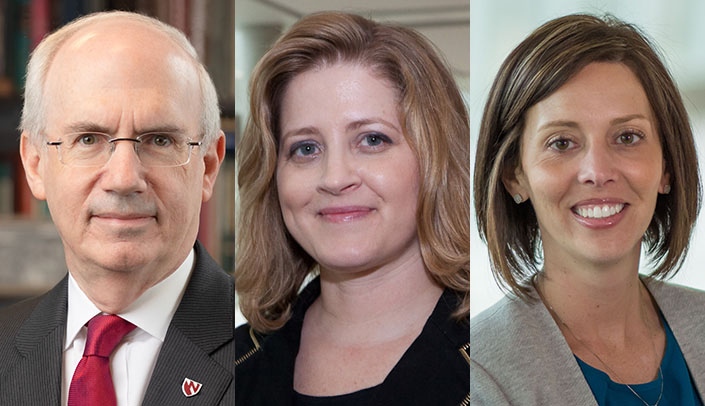UNMC Chancellor Jeffrey P. Gold, MD, on Wednesday welcomed the UNMC community back after the winter break, thanked the attendees and wished all a happy and healthy new year. He shared the story of his holiday week, when he observed omicron’s effects on New York City, and shared some of the grim statistics on the omicron variant’s impact on East Coast law enforcement, health care professionals and other essential workers.
Dr. Gold was joined at the Jan. 12 chancellor’s forum by Jane Meza, PhD, interim executive director for health security at UNMC and the University of Nebraska at Omaha, and Jennifer Bartholomew, vice president and associate vice chancellor for facilities management for UNMC and Nebraska Medicine.
Dr. Gold said the university is watching omicron trends in Nebraska as leaders consider campus safety guidelines. He added that multiple national models predict a peak or plateau near the end of January and a return to a "new normal" baseline in the second week of March. But he cautioned that it was a national projection, and each of the states and local public health districts is most probably going to be different.
As of recent counts, Nebraska was at about 75% omicron variant spread, he said, pointing to a resurgence in hospitalizations, outbreaks in long-term care facilities and the stress on infrastructure, particularly on frontline health care delivery.
Dr. Gold noted that omicron’s severity on an individual basis appears to be considerably less than earlier variants. Even so, the variant’s severity for society due to the very rapid transmission rates, "is really unprecedented," Dr. Gold said.
UNMC leadership continues to monitor the situation daily, Dr. Gold said, adding that location-specific and campus-specific decisions are made on a day-by-day basis.
Dr. Meza outlined UNMC’s response to the omicron surge:
- Following the forum, a new masking policy was announced.
- UNMC is promoting flexible work policies.
- The university is encouraging flexible learning solutions, with a clear focus to continue to successfully meet the needs of its learners.
- Where in-person learning is critical, it will continue with appropriate PPE.
- Lecturers now are asked to wear masks.
- Essential events only are allowed on campus, and outside visitors are limited. Meetings should be held remotely when possible.
- If you have symptoms, contact either employee health or the student health clinic serving your campus for guidance.
- The saliva testing center at Williams Science Hall is again available for asymptomatic individuals, and testing at Doctor’s Building South continues, as well.
"This is a time that, in order to protect our educational mission, our research mission and our clinical mission, our faculty, students and staff need to take extra precautions, not just on campus — which is probably one of the safest places to be in the city right now — but very importantly, when they’re not on campus," Dr. Gold said.
Short of health measures from state and local authorities, university leaders will continue to monitor the situation and make decisions in real time, he said.
"As we started out nearly two years ago and said, ‘The health and safety of our community is the North Star of every decision we will make regarding this pandemic … that has never changed from being the basis of all of our decision making."
Dr. Gold said university leaders are aware of the emotional toll the pandemic has taken on students, faculty and staff. "We are all rolling up our sleeves to do the very, very best to support our mission and at the same time to keep the health, safety and wellness of our families at the top of our priority system."
Dr. Gold also spoke about the university’s UNMC-related American Recovery Plan Act requests to the state:
- A combined project with the University of Nebraska at Kearney to enhance existing health professional education programs and add new programming on the Kearney campus with programmatic support and a new or expanded facility;
- Matched support for the UNMC Pancreatic Cancer Center of Excellence; and
- Continued support for the Global Center for Health Security, which will allow for continued recruitment and programmatic growth.
In addition, UNMC also has been directly asked to participate in a large bill dealing with gaps in behavioral health facilities and workforce development in the state.
Bartholomew provided updates on campus projects:
- Minor construction activity still is ongoing at the Wigton Heritage Center and Wittson Hall.
- Williams Science Hall is open and in use.
- Contractors have submitted proposals for a management group/possible expansion of the campus utility plant.
- A proposal to demolish the old Munroe-Meyer Building near the Fred & Pamela Buffett Cancer Center will be considered by the board of regents in early February.
- The university has consolidated about 25 acres west of Saddle Creek for redevelopment, and two Saddle Creek projects are in final approval stages: the administration tower and the innovation hub. "Neither one of those projects are at an execution point, but we are moving forward with planning for those efforts," Bartholomew said.
Other news from the forum:
- Search processes for the associate vice chancellor of human resources and the vice chancellor for business, finance and business development are underway. A search committee also has been announced for the vice chancellor of research position, following the announcement by Jennifer Larsen, MD, that she will be stepping down from that role in 2022.
Dr. Gold closed the forum by recognizing the late Stanley Truhlsen, MD, whom he called "not only an alum, but a former faculty member, a major benefactor and just an incredible citizen of our community."
He also reminded the UNMC community to take time for self-care, and thanked faculty, staff and students for their continued hard work in the face of the COVID-19 pandemic.
